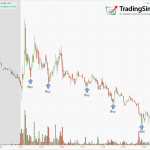Follow the Smart Money by Tracking Insiders
When it comes to investing, there’s a classic piece of advice that many seasoned market players follow: keep an eye on where the insiders are putting their money. While most of us can’t sit down for coffee with a CEO or a board member to get the inside scoop on a company’s prospects, one thing we can do is track their buying and selling activities to get some insights. In this article, we’ll explore the world of insider trading, why it matters, and how an everyday investor can use this information to make smarter investment choices.
What Is Insider Trading?
First things first, let’s talk about insider trading. This term might bring to mind shady deals and unlawful activities, thanks to countless movies and high-profile news stories. But in reality, legal insider trading happens all the time. Insiders – who could be executives, key employees, or significant shareholders – are entirely allowed to buy and sell shares of their own company; they just have to report these transactions to regulatory authorities such as the U.S. Securities and Exchange Commission (SEC).
Illegal insider trading, on the other hand, involves trading based on material, non-public information. That’s a big no-no and can lead to serious trouble with the law. But in this article, we’re focusing on the perfectly legal kind of insider trading that can provide valuable signals to outside investors.
Why Should You Care About Insider Trades?
So, why bother looking at what insiders are doing with their stocks? Well, insiders know their company better than anyone else. If they’re buying up large quantities of stock, it might suggest they believe the company is on the rise; conversely, if they’re selling, it could indicate that they think the company is facing headwinds.
However, it’s important to do your homework. Not every insider trade is a clear-cut indication of the company’s future performance. Executives may sell shares for personal reasons – such as buying a house or funding a child’s education – that have nothing to do with their outlook on the company. That’s why it’s crucial to look at the context of these transactions. For instance, if multiple insiders are buying shares, it tends to be a stronger signal than a lone insider making a transaction.
How to Track Insider Transactions
Tracking insider trades doesn’t require special access or tools; the information is there for anyone who’s willing to look for it. In the United States, insiders must report their trades to the SEC by filling out forms like Form 4 and Form 5. You can find these reports on the SEC’s EDGAR database online. Other countries have similar regulations and public databases.
Many financial news websites and services also summarize these reports, making it easier to keep up with insider activity. They often highlight significant buying or selling patterns, which can draw your attention to potential investment opportunities.
Tips for Following Insider Trades
If you’re ready to start using insider trading data to enhance your investment strategy, consider these tips:
- Look for Meaningful Transactions: Small trades might not be very significant, as they could just be part of an insider’s regular financial planning. Focus on large, out-of-the-ordinary transactions that represent a strong vote of confidence or concern about the company’s future.
- Follow the Leaders: When a high-level executive like a CEO or CFO buys or sells a considerable amount of stock, it can be more indicative of the company’s prospects than a lower-level insider’s trading activity.
- Consider the Timing: Transactions that take place around key events, such as just before earnings reports or product launches, can be particularly telling.
- Watch for Clusters: Several insiders buying or selling around the same time can signal a consensus among those who know the company best.
- Use Insider Data as One Piece of the Puzzle: Insider trades should not be the sole factor in your investment decisions. Instead, view them as valuable pieces of intel that complement your broader research.
What Insider Trading Can’t Tell You
While following insider trades can be informative, it’s not foolproof. Insiders might have different motivations for their trades, and even with their knowledge, they can’t predict the future. Market conditions, unforeseen events, and broader economic trends all play a role in a company’s success and are beyond any one person’s control.
The Ethical Approach to Following Insiders
Transparency is key when it comes to following insider trades. Responsible investors respect privacy and legality. Never seek non-public material information to make an investment decision. Stick to the publicly available filings and use them as legal insights to guide your investment choices.
Real-Life Examples of Insider Trading
Let’s illustrate the points above with some real-life examples. Imagine the CEO of a promising tech startup buys a significant number of shares in their own company. This move could signal they have confidence in an upcoming product. On the flip side, if several board members simultaneously offload their shares, it could raise red flags about the company’s future.
Back in 2006, before the housing market collapsed, many financial insiders were selling off their stocks despite the industry seeming robust to the outside world. This was a subtle indicator of the impending financial crisis that savvy investors could have used to their advantage.
Final Thoughts on Following the Smart Money
Tracking insider trades can certainly give you an edge in your investment decisions, provided that you approach it as part of a comprehensive analysis. Remember, while insiders might have access to more information than the average investor, they’re still subject to the same uncertainties that affect the stock market.
As an investor, always diversify your sources of information and focus on long-term trends rather than short-term gains. With a level-headed approach and by following the smart money in a conscientious way, you could make informed decisions that benefit your investment portfolio. Do your due diligence, stay informed, and let the legitimate and revealing actions of insiders inform your investment strategy in a powerful, yet ethical, manner.


